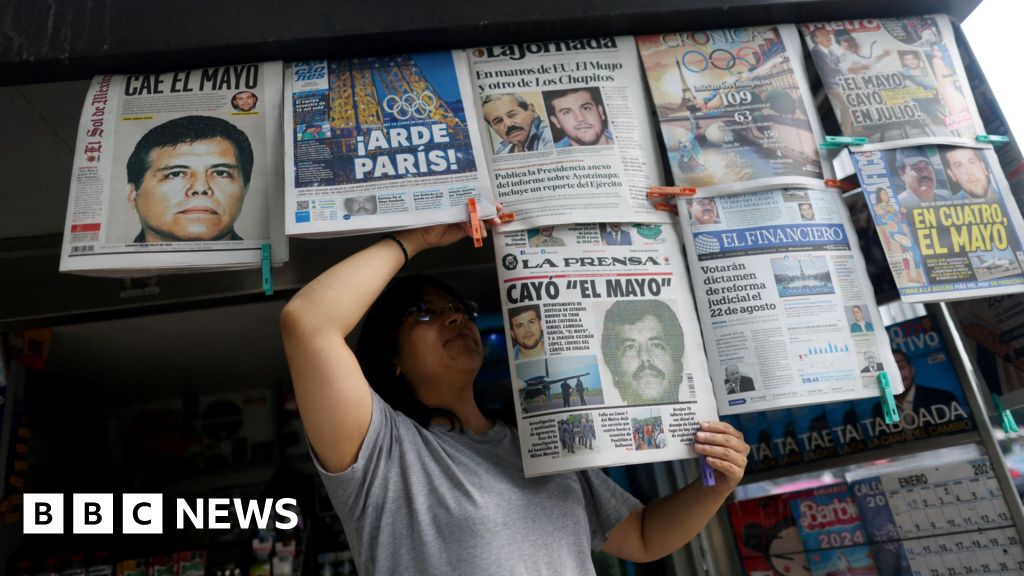Ismael ‘El Mayo’ Zambada is one of most notorious names in drug war history, synonymous with the fearsome power and corrosive influence of the most important drug cartel in the world.
The last of an original generation of drug cartel leaders, he created the Sinaloa Cartel alongside Joaquin ‘El Chapo’ Guzman from the remnants of the Guadalajara Cartel after it collapsed in 1989.
But unlike his infamous partner who was twice jailed and escaped, El Mayo was able to evade arrest for some 35 years. Until now.
He has already pleaded not guilty to multiple charges in federal court in Texas.
He was lured to the US as part of an elaborate sting operation, masterminded by the son of his former partner, El Chapo. Joaquin Guzman Lopez, one of the heirs to El Chapo’s operation, was arrested alongside Zambada having led him to believe he was travelling to northern Mexico to look at prospective properties for clandestine airstrips.
“Are you worried of being captured?” Zambada was asked in 2010 by the late Mexican journalist, Julio Scherer García, who had travelled deep into the mountains for an unprecedented interview with the drug lord.
“The idea of being jailed gives me panic,” he answered. “I’m not sure I have what it takes to kill myself. I’d like to think I do and that I’d take my own life.”
When it came to it, however, either he didn’t have the means or the opportunity.
For someone who exercised such caution over so many years, it seems extraordinary that Zambada was duped aged 76. Perhaps it was always going to take something unique to see him in custody.
“It doesn’t surprise me that Zambada didn’t go willingly,” says Mike Vigil, a former DEA agent. “He is in his 70s, in poor health and already said that prison was his greatest fear.”
The arrests – and possible plea deal between the sons of El Chapo, known as Los Chapitos, and the US Government – begs the question of who will take control of the Sinaloa Cartel.
After El Chapo Guzman was arrested and extradited to the US in 2016, a round of bloodletting began as rival factions wrestled for control of territory as well as fought opposing drug gangs who sensed weakness.
Even more shocking, and violent, was the response of the Sinaloa Cartel’s foot soldiers when their leader, Ovidio Guzman Lopez, was arrested in October 2019.
After he was detained, hundreds of gunmen descended on the city of Culiacan and opened fire on civilian, police and military targets with .50 calibre weapons and rocket launchers. Eventually, the authorities handed Ovidio Guzman back to his men to bring the fighting to an end.
He was later re-arrested, extradited and is currently awaiting trial in a US prison.
Mike Vigil thinks a similar explosion of violence, which became known as the Culiacanazo, might be avoided this time around:
“The Sinaloa Cartel has a very strong bench of possible leaders who could take over including El Chapo’s brother,” he says.
In fact, Mr Vigil argues, the “Kingpin strategy” – that is focusing on bringing down individual cartel leaders – is rarely successful.
“Under the administration of (then-Mexican President Felipe) Calderon, it only tended to create internal conflict within the cartels which then led to a bloodbath.”
If that happens this time, suggests former DEA agent Mike Vigil, “the only winner would be their rivals, the Jalisco New Generation Cartel (CJNG)”.
That said, moments of flux and possible power vacuums such as this one are deeply unpredictable. The Mexican authorities have already sent additional forces to the state of Sinaloa ahead of any flare-up of violence.
The other obvious question over Zambada’s arrest is: why now?
The operation was planned for months. However, some reports say there was also an opportunistic element to it. When the various elements behind the ruse appeared to be coming together, despite some scepticism among the US authorities, they ultimately decided they had nothing lose by trying it.
The bigger reason behind the timing, though, was revealed by the words of the US Attorney General Merrick Garland in a video message confirming the arrests:
“Fentanyl is the deadliest threat our country has ever faced”, he said promising that the US justice department “will not rest until every single cartel leader, member and associate responsible for poisoning our communities is held accountable.”
Fentanyl overdoses are now the leading cause of death for Americans between the ages of 18 and 45. It is a staggering statistic and one that has perhaps focussed minds in the Biden administration, especially in an election year.
Both Los Chapitos and El Mayo have made billions through fentanyl, which is easy to produce and transport without the need for large coca plantations in the Andes as with the manufacture of cocaine.
Experts say that shutting down the smuggling of fentanyl altogether is virtually impossible. It is simply too profitable to the cartels and too riven into the modern landscape of Mexico’s drug war.
However, US law enforcement wants to hurt the cartels that are producing it, diminish their influence and, wherever possible, dismantle their leadership.
The capture of El Mayo Zambada – even if aging, in poor health and captured in a double-cross – was always going to remain a key part of that strategy.
